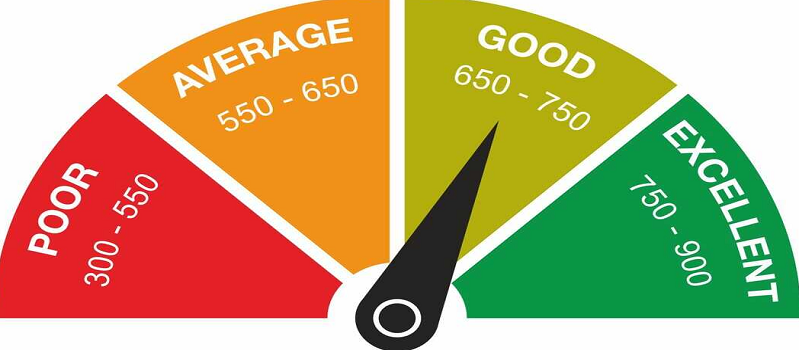A credit score is a three-digit number that credit reference agencies calculate using their own scoring models based on the information on your credit report such as payment history, the length of credit history and the amount of debt you owe.
Your credit score decides whether or not you will be able to get the nod for a loan you have applied for. There are three types of credit reference agencies – Experian, Equifax and TransUnion. Your lender may reach out to anyone to get your credit file.
Your credit score cannot be the same across all agencies due to different scoring models.
TransUnion uses the vantage score scoring model while Equifax uses the FICO score scoring model. Scoring models and score assessments slightly vary. However, the latter is the same for Experian and Equifax.
| TransUnion Scoring Model | Equifax Scoring Model | ||
| Payment history | 40% | Payment history | 35% |
| Credit mix | 21% | Credit mix | 10% |
| Credit utilisation | 20% | Credit utilisation | 30% |
| Total credit balance | 11% | Credit history | 15% |
| Recent credits | 5% | Recent credits | 10% |
| Available credits | 3% | ||
What makes a good credit score?
There are there agencies that keep a record of your credit and use their own methods to calculate your score. The following table shows the range from all three bureaus:
| Credit score range | Experian | Equifax | TransUnion |
| Excellent | 961 – 999 | 800 – 850 | 781 – 850 |
| Good | 881 – 960 | 740 – 799 | 661 – 780 |
| Fair | 721 – 880 | 670 – 739 | 601 – 660 |
| Poor | 561 – 720 | 580 – 669 | 500 – 600 |
| Very poor | 0 – 560 | 300 – 579 | 300 – 499 |
The range of a good credit score varies by credit reference agency. So, people often ask what exactly a good credit score is. Well, there is no particular credit score. You should aim for as high a credit score as possible.
“A lender will go through your credit report, but they use their own formula to calculate your credit score.”
They access your credit file in order to find information related to previous defaults, the number of debts you owe, recent credits, and so on.
Although you do not know the method lenders use to calculate your score, it will certainly be good if it falls in the range of a good rating on your credit report. Further, it is unlikely that two credit bureaus show you in a different credit score category.
Why should you have a good credit score?
A good credit score is intrinsic to getting a favourable loan deal. A lender finds borrowers with a decent credit report more attractive than subprime borrowers. A good credit rating shows that you are a responsible borrower. You stay committed to your financial commitments.
“A lender will find you less risky, so they will be able to loan you a larger sum of money. You are more likely to get the best deals on credit cards, mortgages, overdrafts and other small emergency loans.”
How can I improve your credit score?
Unlike traditional banks, online lenders accept applications from subprime borrowers. It is not impossible to get bad credit loans from a direct lender, but they will be expensive. You are considered a borrower with a high default risk, so interest rates will be higher.
Further, lenders may restrict you from borrowing a large amount of money when your credit rating is not up to scratch. It is vital that you do up your credit score. It may take some time, but it is worth it. Here are the tips to follow to improve your credit score.
- Show financial stability
It is good to have a strong income source, but it is not the be-all and end-all. “You should be able to prove to your lender that your income is consistent whether you are a self-employed or a full-time employee.”
Further, your credit report should not imply that you oftentimes rely on debts to meet your expenses. You can do it by avoiding multiple inquiries within a very short time. Otherwise, a lender will treat you as a desperate borrower.
Another way to show financial stability is timely payments of your debts. It shows your commitment and loyalty towards the credits you owe. If your credit file reveals a few missed payments, they must not be too many and frequent.
- Do not close accounts
It is normal to close your accounts when you do not use your cards and have got to pay fees. For the sake of saving a few pennies, you end up taking a toll on your credit score. It will reduce your credit history and increase your credit utilisation ratio.
For instance, you have got two credit cards, each with a limit worth £500. You have used 40% of one of two credit cards. Your credit utilisation ratio will be 20%. But if you use an unused credit card, the ratio will be 40%, which is double. The credit utilisation ratio should not exceed 30%.
- Try to take out a credit builder loans
Credit builder loans are quite popular to help subprime borrowers improve their credit scores. Unlike small bad credit loans, these loans will require you to pay down in fixed monthly instalments.
If you clear your dues on time, timely payments will be recorded on your credit report. This will help improve your credit rating. A few lenders like LoansForever provide bad credit loans to be paid off over the course of time. These loans can also help make your credit file better if you settle the debt on time.
What other things should you know?
Your credit score will certainly improve provided you do not miss the due date. Do not forget that rent, energy bills and broadband bills should also be paid on time. But you may not see the improvement you look forward to.
- No timely payments can remove previous missed payments and defaults. As long as they are on your report, they will have an impact on your score.
- Lenders do not bother about old defaults or missed payments but it does not mean that you will enjoy lower interest rates.
- Credit builder loans can be expensive. Give it a second thought so you do not regret it down the line.
- Keep tabs on your credit score by asking for your file from all credit bureaus. Dispute the error if you find any on your credit report.
- Your credit score may vary by credit report agencies. This is because not all lenders inform all bureaus of your timely payments.
- Small loans including bad credit loans repaid in full on the due date do not help build or improve your credit rating.
The bottom line
A good credit score is nothing but a three-digit score that makes you eligible to take out a loan at the most affordable interest rates. A good credit score range varies by credit reference agencies due to different scoring models. Another reason is lenders do not inform all agencies of your payments.
It is hard to build or improve your credit score and therefore the impact of your bad credit rating may last for years. You should try to borrow money only when it is urgent and you are sure you will not fall behind in payments.









